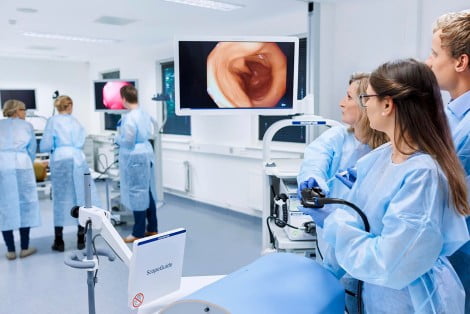Foundations of Modern Medicine: A Comprehensive Training Program
The landscape of medicine training courses is continuously evolving, aiming to equip future healthcare professionals with the skills and knowledge necessary to navigate an increasingly complex and interconnected world. This evolution reflects a recognition of the diverse challenges faced by healthcare systems and the need for comprehensive training that extends beyond traditional clinical education.
One prominent trend is the focus on health equity and social justice. Training programs are increasingly incorporating curricula that address social determinants of health, emphasizing the impact of factors like socioeconomic status, race, and environment on health outcomes. Students are encouraged to engage in community health initiatives that aim to reduce disparities and promote equitable access to care. This approach cultivates a sense of social responsibility, empowering future practitioners to advocate for vulnerable populations and contribute to systemic change.
Resilience training is another critical component being integrated into medical education. Recognizing the high rates of burnout and mental health issues among healthcare professionals, many programs are prioritizing the development of coping strategies and resilience-building techniques. Workshops on mindfulness, stress management, and self-care encourage students to cultivate healthy habits that can sustain them throughout their careers. This emphasis on well-being not only benefits the providers but also enhances the quality of care they deliver to their patients.
In the realm of technology integration, medical education is rapidly adapting to include training on digital health tools, telemedicine, and data analytics. As healthcare becomes increasingly data-driven, students learn to utilize electronic health records, interpret health data, and engage with telehealth platforms. This proficiency allows graduates to navigate the technological landscape effectively, improving patient communication and access to care while ensuring they can leverage data to inform clinical decisions.
Interdisciplinary collaboration is gaining importance as well. Medical training is increasingly emphasizing the value of working alongside professionals from various healthcare fields. Students often participate in joint exercises and collaborative projects, enhancing their ability to function within multidisciplinary teams. This experience not only prepares them for real-world healthcare settings but also fosters a deeper understanding of the diverse roles within the healthcare system, promoting more coordinated and holistic patient care.
Another innovative corso intensivo per medico estetico teoria e pratica approach is the inclusion of storytelling and narrative medicine in the curriculum. By emphasizing the power of narratives in healthcare, students learn to appreciate patients’ stories and the context of their experiences. This training helps cultivate empathy and improves communication skills, enabling future practitioners to build stronger, more trusting relationships with their patients. Understanding the narrative behind a patient’s illness can lead to more personalized care and better health outcomes.
The importance of environmental sustainability in healthcare is increasingly being recognized. Medical training programs are beginning to address the environmental impact of healthcare practices, encouraging students to consider sustainable approaches in their future practices. Topics such as waste reduction, energy efficiency, and the health effects of climate change are integrated into curricula, preparing graduates to be advocates for sustainable healthcare practices.
Additionally, the exploration of health innovation and entrepreneurship is becoming more prevalent. Students are encouraged to think creatively about solutions to current healthcare challenges. This includes developing new technologies, improving care delivery models, or launching initiatives that enhance patient engagement. By fostering an entrepreneurial mindset, training programs prepare graduates to be proactive agents of change who can navigate the complexities of the healthcare landscape.
Simulation-based learning continues to play a crucial role in medical education. Advanced simulation centers allow students to practice clinical skills in realistic scenarios, enhancing their clinical judgment and decision-making. High-fidelity simulations mimic real-life situations, providing students with invaluable hands-on experience before they interact with patients. This practical training fosters confidence and competence, ultimately leading to better patient care.
Furthermore, an increasing emphasis on mental health literacy is being incorporated into medicine training. Understanding mental health disorders and their impact on overall health is essential for providing comprehensive care. Students learn to recognize signs of mental health issues and how to address them sensitively and effectively. This training prepares future healthcare professionals to offer holistic care that considers both physical and mental health needs.
Ethics and professionalism remain central themes throughout medical education. As students face complex ethical dilemmas in their training, they are encouraged to engage in discussions that explore the moral implications of their decisions. This training not only fosters ethical reasoning but also instills a commitment to professionalism, ensuring that graduates uphold the highest standards of care in their practice.
Lastly, the concept of lifelong learning is being ingrained into the culture of medical training. With rapid advancements in medical science, students are taught the importance of staying current with emerging research and best practices. Encouraging a mindset of continuous improvement and education prepares graduates to adapt to new challenges throughout their careers, ultimately benefiting their patients and communities.
In conclusion, medicine training courses are evolving to encompass a wide array of skills and knowledge essential for modern healthcare practice. By focusing on health equity, resilience, technology integration, interdisciplinary collaboration, storytelling, environmental sustainability, innovation, simulation-based learning, mental health literacy, ethics, and lifelong learning, these programs are preparing graduates to be compassionate, competent, and proactive healthcare professionals. As they embark on their careers, they are equipped not only to provide high-quality medical care but also to lead initiatives that drive positive change within the healthcare system and contribute to the well-being of diverse populations.
